Spanish evangelical university students organise ‘events weeks’ to respond from a biblical perspective to the concerns of their friends.
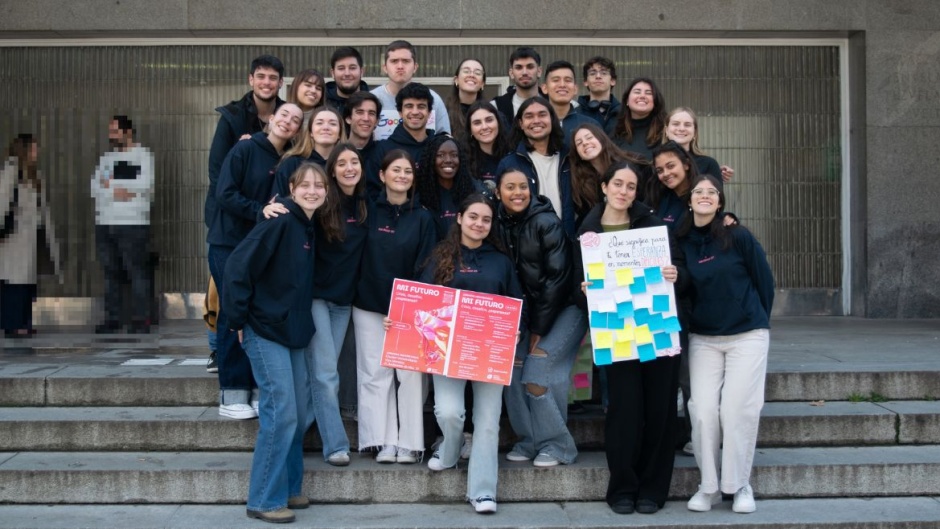 Members of GBU at the University Complutense of Madrid.
Members of GBU at the University Complutense of Madrid.
Under the title ‘My future: crisis, challenges, hope?’, the Christian university association GBU (IFES in Spain) in Madrid held their university events week from 24-27 February.
The students organised a series of activities that aimed to connect the concerns of their generation with the answers that the Bible and its protagonist, Jesus, have to offer.
To prepare the activities, members of the University Bible Groups at the Complutense University went around campus in December asking their friends and classmates what issues concerned them and what topics should be addressed.
All the answers had a common thread: concern for the future. Therefore, the students of the host university, helped by other members of the Christian association, gave shape to a whole week of activities.
The GBU students started each day at 8:30 am by meeting at their premises on campus, accompanied by a good coffee and some breakfast, to pray and meditate together on the biblical teachings.
They organised the rest of the day, and went out to advertise on campus until the start of the afternoon activities.
They divided into groups, each taking flyers, candy, post-its, pens and a poster with a question related to the topic of the next talk. They invited people to answer the question in exchange for a treat, opening up an honest space for dialogue and inviting people to the talk.
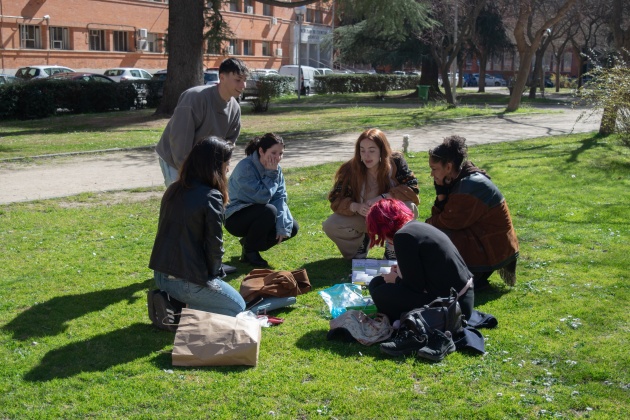
[photo_footer]Students of GBU Madrid talking with other university students. [/photo_footer]
An example of this is what Carla, Cecilia, Alba and Marcos experienced when they were promoting one of the activities.
They approached a group of students at the Faculty of Physics and talked to them about GBU: “One girl said that she was envious of our faith, and we told her that she could have that faith too”. At one point in the conversation, one of them admitted that “when you study the physics of the universe, everything is too perfect not to point to a God”, but they admitted that their doubts prevented them from getting close to God.
“That's when we told her that faith just comes at that moment”, says Carla, who still keeps in touch with as they expressed an interest in learning more about the Bible.
The Aula Magna of the Faculty of Physics hosted Monday's event, a discussion on the climate crisis, which was attended by around 30 people, organised by GBU and the NGO World Vision.
Nieves Carabaña, collaborator of World Vision, gave an overview of the organisation, paying special attention to its projects related to the climate crisis. The emphasis was on the Farmer Managed Natural Regeneration, a project to re-green forests that has successfully reclaimed one million hectares of land in 27 different countries.
The keynote talk was given by Federico Velázquez de Castro, a former student of the Complutense University of Madrid, who holds a PhD in physical chemistry and environmental sciences.
Federico's thesis on tropospheric ozone pollution was the first global study with predictive models in Spain. It was unanimous among the attendees that Velasquez was a “professional and unbeatable” speaker, as Juan Romanos, a student who was invited to the colloquium by a fellow GBU member, said.
Velasquez challenged the audience to rethink their lifestyles so that their actions would be a sign of their theoretical commitment to the environment. “In the midst of a world that devours everything, we must live slowly” he stressed, pointing out some possible good practices in terms of housing, leisure, consumption.
But, “is it really possible to put those measures into practice living in a consumerist world?” Jimena Lozano, a medical student and member of GBU, raised that question during the Q&A session, verbalising a concern that several of the attendees had.
The speaker answered that it was, explaining how to reconcile the active taking of sustainable personal decisions with the recognition that the climate crisis goes to the root of the system in which we live.
He also addressed the concept of ‘eco-anxiety’ and highlighted the importance of not carrying too much weight on a personal level.
Knowing that there is a future for the climate crisis, Federico stressed that the Bible says that humans have a responsibility towards all of God's creation.
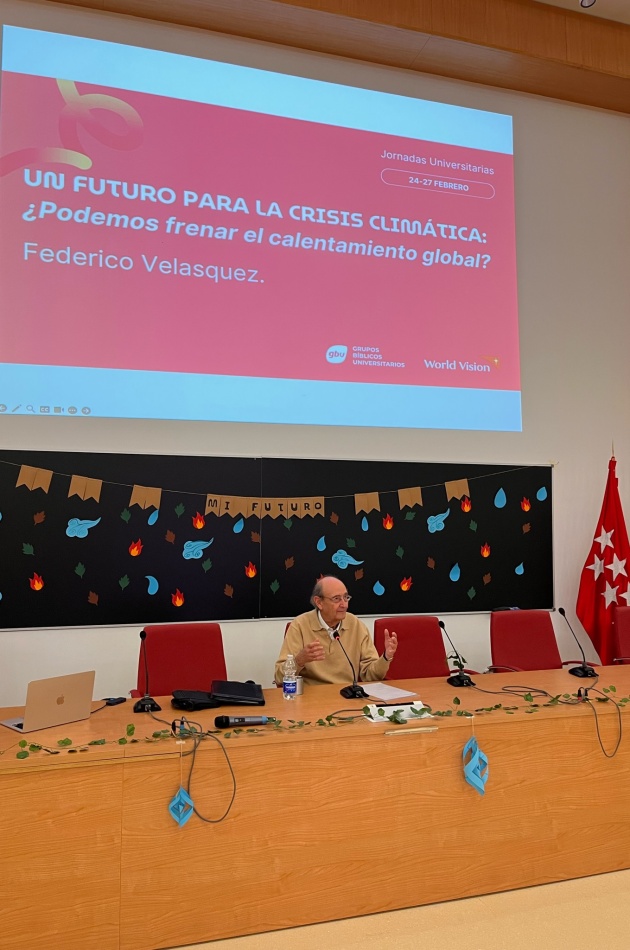
[photo_footer]Federico Velázquez de Castro during his talk. [/photo_footer]
The next day, a poster reading “We are GBU, what would you ask us?” presided over the hall of the Faculty of Philology of the Complutense University of Madrid.
Under that premise, students, teachers and members of the university community submitted questions related to the Bible, Jesus, Christianity, spirituality. Some of them would be answered at one o'clock in the afternoon in an event called ‘Ask us’.
The activity was based on the British ‘Grill a Christian’ format, in which other university students could ‘grill’ members of the Christian Unions (part of the UCCF in the UK) with questions.
With the same aim, GBU students Félix, Samuel, Jimena, Felipe, Carla and Marina were publicly questioned, with Héctor Molero, a student of Journalism and Communication, as moderator.
“Is Jesus the Son of God?”, “Are members of organisations like Opus Dei really Christians?”, “Would you be willing to rethink your faith?”. These were some of the questions asked.
The answers, sometimes difficult to give and sometimes difficult to accept, left none of the over 50 participants indifferent, many of whom had to stand due to the limited space in the room.
Gerson Mercadal, a former member of GBU and communicator of the Pontea Foundation, also participated in the event to support the students questioned.
“People were genuinely interested in being part of the conversation, and saw the event as a real, safe and open forum to talk about important life questions,” said Mercadal.
The students participated enthusiastically - so much so that there was not enough time to answer all the questions.
Andrea Morales, a history student who was invited to the event, described it as “intimate and welcoming”. “It helped me to see the biblical perspective, but also to hear people's doubts and see how they were so open to ask questions and understand GBU's point of view, even if they didn't think the same”, she said.
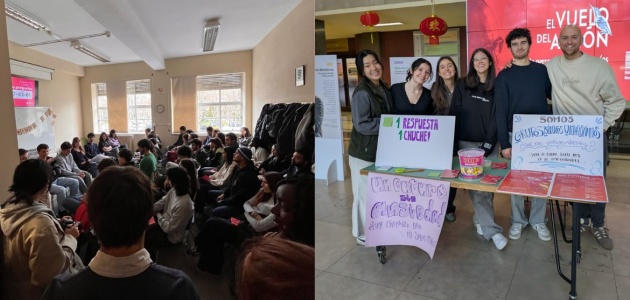
[photo_footer]Ask us event. / Juan Hernández, one of the speakers. [/photo_footer]
For Tuesday's event, as well as for the rest of the week's talks, GBU was able to use the ground floor of a restaurant near the campus, offering free snacks to those attending the event.
The artists Amada and Dami played live music, sharing their own compositions with the audience. During their performance, the singers invited guests to accompany them by clapping or singing part of the songs, establishing a welcoming and friendly atmosphere that continued throughout the afternoon.
The talk that day was given by social worker and GBU staff worker Juan Hernández, who emphasised the need to address the issue of corruption, in order to tackle the injustice and pain caused by such evil.
During the talk, Juan pointed out that we tend to associate corruption only with politics, however, corruption also affects a significant part of people's daily lives: from not telling the whole truth to get a scholarship, to speeding when the traffic light has just changed to red, to telling the teacher that someone is not going to class because they are sick when they are actually at home resting.
Such examples show that “we are even corrupt in the slightest, and therefore not so different from those political agents we complain so much about”, as Andrew Mendoza, who attended the event and is an active participant in the GBU, put it.
Once this truth has been exposed, a sincere question naturally arises: Is there a solution to overcome corruption, both internal and external? Hernandez believes there is, and his answer is Jesus.
Christ was also affected first hand by corruption, it is enough to remember his last moments alive, when different men, who saw no guilt in him, washed their hands of him and had him humiliated and crucified.
Because of this, Hernandez argued that the Bible's main character not only understands each person because he has experienced injustice first hand, but he promises that anyone who seeks him, and thus justice, will experience a renewal of mind and heart.
Finally, the speaker pointed out that this new vision will lead to detest that which is unjust and to fight to stop it, but also to rest in the promise of a future without corruption.
Guest artists Dario Prieto and Necko Vidal sang their own personal and intimate songs, creating a vulnerable and safe space for the event and the topic of the day; exemplifying how each person struggles with internal struggles, whatever they may be.
Afterwards, Miguel Rey addressed the central theme of the presentation. The psychologist stood out for his calmness and sincerity throughout the presentation, approaching the subject through personal experiences and, at the same time, providing data and statistics on the current mental health panorama.
“I am a psychologist and I struggle with anxiety”, admitted Rey. He then began to list the different proposals that society currently offers to face the internal battles we all fight. However, the psychologist concluded that, although some of them are useful, there is still an obvious problem: “All the responsibility falls on oneself, putting a pressure on me that knocks me down even more”.
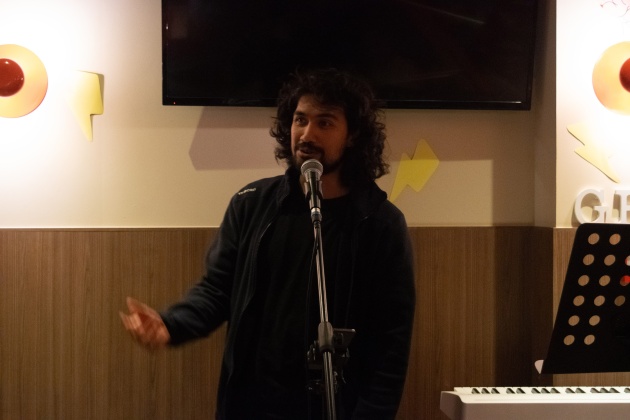
[photo_footer]Miguel Rey during his talk. [/photo_footer]
“When you feel that no one sees you, it is crucial that someone reminds you that you are seen, and that we realise that other people have a role in our lives, and we have a role in other people's lives, and this inevitably has consequences, both good and bad”, he added.
For the psychologist, the person of Jesus is the proposal “different from the others”, because when Jesus is asked what is the most important thing in life, he answers: to love God with everything, and to love people as yourself (Matthew 22:37-40).
He stressed that the first part, which is most often forgotten, is the key, “because it simply means that God loves you”. “His offer does not depend on me always getting it right all the time, but I just have to trust that there is a God who loves me, who cares about me, and does not abandon me, even when I fail”. “He doesn't say 'Fix yourself up to be right with me or with others', but rather says 'Look at me’” .
On Thursday, the event was filled with people from different worldviews and lifestyles.
Live music was provided by Marina Fernández, Josué Stunt and Daniel Stunt, who are actively involved in GBU Madrid, and the speaker was Andy Wickham, director and communicator of the Pontea Foundation.
In a relaxed presentation, Wickham delved into the meaning of hope through quotes from renowned personalities and scientists, reaching the conclusion that “the heart of the problems is the problem of the human heart”, an issue that cannot be solved only with “make-up and paracetamol”.
Wickham spoke of “Jesus’ diagnosis”, which determines that what comes out of our heart is what contaminates us (Matthew 15:18-20). Therefore, “the cause of this condition lies in the separation from the source of love - God -, we need a heart transplant, and therefore we need a donor”.
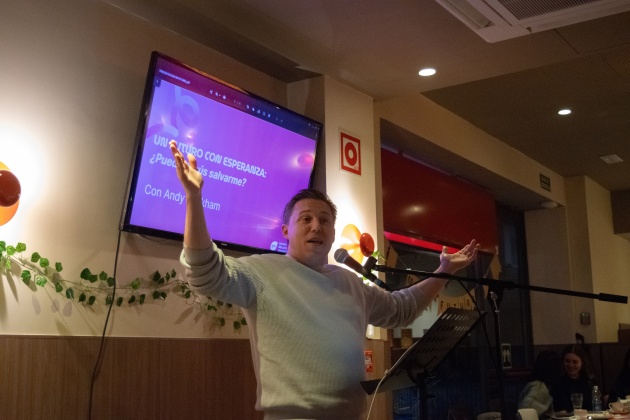
[photo_footer]Andy Wickham during his talk. [/photo_footer]
For the speaker, the donor is Jesus, and the scientific and historical evidence of his resurrection “leads to admit that this is the most coherent possibility among all the probable options”.
Finally, he highlighted the change of nature that can be seen in many people who claim to have a personal relationship with Jesus, what the Bible calls “a change from a heart of stone to a heart of flesh”.
“Come to me, all you who are weary and burdened, and I will give you rest”, Wickham quoted Jesus' words, as a living hope that can turn every person's life around.
Wickham ended the talk with a prayer inviting everyone to talk to God in that way, either alone at home or with another person after the event.
He also suggested the audience to read the Bible and make use of the books offered by Andamio, a publishing house linked to the GBU in Spain. “There is so much that you are missing out on that you can make your own today”, he said, encouraging the audience not to respond to this hope.
For Paula Banda, a student who attended the talks encouraged by her classmate, “all the events were a very good way to bring the Bible closer to people who don't know Christianity, connecting it with questions that matter to people”.
Alba Silguero, anthropologist and PhD student, described the atmosphere as “open and welcoming to those outside” the Christian group.
Jaime Segura, professor at the Complutense University of Madrid, appreciated the conversations that took place after the talks. “To say that the people who organise it are charming would be quite an understatement”, he underlined.
The members of GBU seek to keep that essence in all their meetings, especially in the get-togethers that, a month later, they continue to hold with people interested in learning more about Jesus and the Bible.
Every two weeks, a group of students gather in a cafeteria near campus for lunch or a snack, to discuss the topics covered during the events.
“We have witnessed how God blesses the united witness of a generation that is courageous, sincere, committed and connected to the world around them and to Jesus in all areas of their lives”, says Laura Perez, a GBU staff worker to the Madrid group. “It is a privilege to see that, although God does not need us, He makes us part of and collaborators in the mission that He moves”, she adds.
Other regional student groups of GBU Spain groups have also held their own university events week over the past few weeks in cities such as Murcia, Santiago de Compostela, Castellón, Ciudad Real, Pontevedra, Sevilla, Málaga and Tenerife.
All these groups, even at a distance, support and advise each other, bearing in mind that they are united by something that goes beyond themselves: the person of Jesus Christ.
[analysis]
[title]Join us to make EF sustainable[/title]
[photo][/photo]
[text]At Evangelical Focus, we have a sustainability challenge ahead. We invite you to join those across Europe and beyond who are committed with our mission. Together, we will ensure the continuity of Evangelical Focus and our Spanish partner Protestante Digital in 2025.
Learn all about our #TogetherInThisMission initiative here (English).
[/text][/analysis]

Las opiniones vertidas por nuestros colaboradores se realizan a nivel personal, pudiendo coincidir o no con la postura de la dirección de Protestante Digital.
Si quieres comentar o